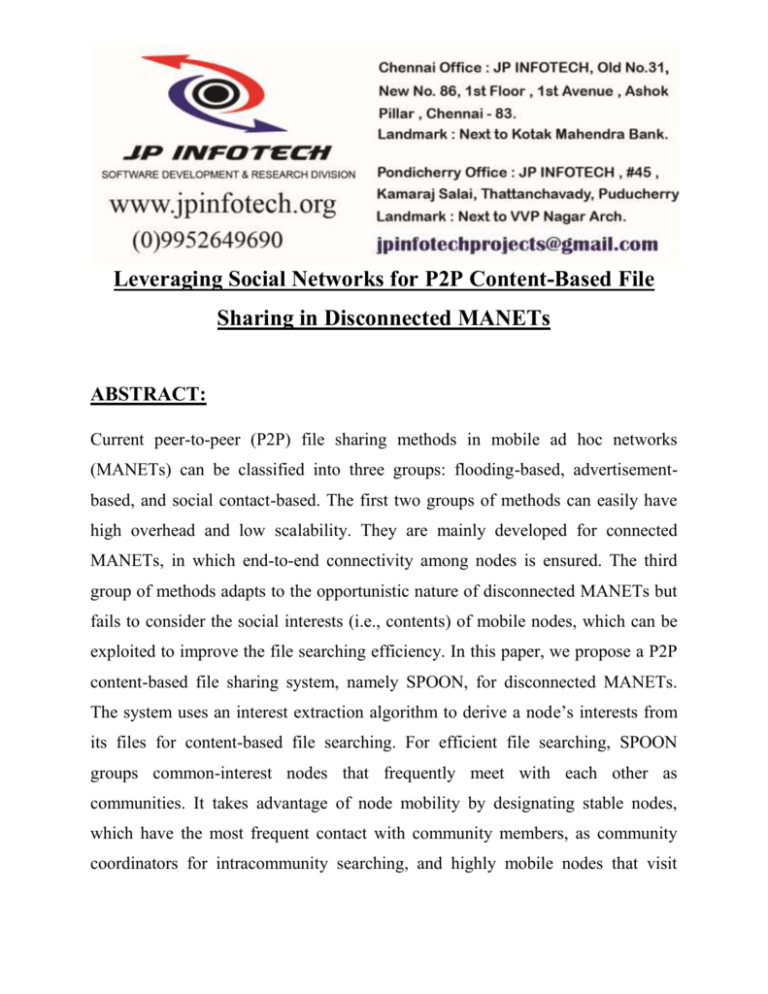Abstract
advertisement

Leveraging Social Networks for P2P Content-Based File Sharing in Disconnected MANETs ABSTRACT: Current peer-to-peer (P2P) file sharing methods in mobile ad hoc networks (MANETs) can be classified into three groups: flooding-based, advertisementbased, and social contact-based. The first two groups of methods can easily have high overhead and low scalability. They are mainly developed for connected MANETs, in which end-to-end connectivity among nodes is ensured. The third group of methods adapts to the opportunistic nature of disconnected MANETs but fails to consider the social interests (i.e., contents) of mobile nodes, which can be exploited to improve the file searching efficiency. In this paper, we propose a P2P content-based file sharing system, namely SPOON, for disconnected MANETs. The system uses an interest extraction algorithm to derive a node’s interests from its files for content-based file searching. For efficient file searching, SPOON groups common-interest nodes that frequently meet with each other as communities. It takes advantage of node mobility by designating stable nodes, which have the most frequent contact with community members, as community coordinators for intracommunity searching, and highly mobile nodes that visit other communities frequently as community ambassadors for intercommunity searching. An interest-oriented file searching scheme is proposed for high file searching efficiency. Additional strategies for file prefetching, queryingcompletion, and loop-prevention, and node churn consideration are discussed to further enhance the file searching efficiency. We first tested our system on the GENI Orbit testbed with a real trace and then conducted event-driven experiment with two real traces and NS2 simulation with simulated disconnected and connected MANET scenarios. The test results show that our system significantly lowers transmission cost and improves file searching success rate compared to current methods. EXISTING SYSTEM: The flooding-based methods, 7DS is one of the first approaches to port P2P technology to mobile environments. It exploits the mobility of nodes within a geographic area to disseminate web content among neighbors. Passive distributed indexing (PDI) is a general-purpose distributed file searching algorithm. It uses local broadcasting for content searching and sets up content indexes on nodes along the reply path to guide subsequent searching. GCLP is an advertisement-Based Methods for efficient content discovery in location-aware ad hoc networks. It disseminates contents and requests in crossed directions to ensure their encountering. P2PSI combines both advertisement (push) and discovery (pull) processes. It adopts the idea of swarm intelligence by regarding shared files as food sources and routing tables as pheromone. DISADVANTAGES OF EXISTING SYSTEM: The advertisement-based methods generate high overhead for advertising and cannot guarantee the success of file searching due to node mobility. The flooding-based methods produce high overhead due to broadcasting. PROPOSED SYSTEM: We propose a social network-based P2P content file sharing system in disconnected mobile ad hoc Networks. The system uses an interest extraction algorithm to derive a node’s interests from its files for content-based file searching. We focus on the P2P file sharing in a disconnected MANET community consisting of mobile users with social network properties. The disconnected MANETs are featured by sparse node density and intermittent node connection, which makes the flooding based methods and advertisement based methods infeasible in such networks. The proposed system considers both node interest and contact frequency for efficient file sharing. For efficient file searching, the proposed system groups common-interest nodes that frequently meet with each other as communities. ADVANTAGES OF PROPOSED SYSTEM: The proposed system considers both node interest and contact frequency for efficient file sharing. The proposed system takes advantage of node mobility by designating stable nodes Strategies for file pre-fetching, querying-completion, and loop-prevention, and node churn consideration are used to further enhance the file searching efficiency. SYSTEM ARCHITECTURE: SYSTEM REQUIREMENTS: HARDWARE REQUIREMENTS: System : Pentium IV 2.4 GHz. Hard Disk : 40 GB. Floppy Drive : 1.44 Mb. Monitor : 15 VGA Colour. Mouse : Logitech. Ram : 512 Mb. SOFTWARE REQUIREMENTS: Operating system : Windows XP/7. Coding Language : C#.net Tool : Visual Studio 2010 Database : SQL SERVER 2008 REFERENCE: Kang Chen, Student Member, IEEE, Haiying Shen, Senior Member, IEEE, and Haibo Zhang. ”Leveraging Social Networks for P2P Content-Based File Sharing in Disconnected MANETs”. IEEE TRANSACTIONS ON MOBILE COMPUTING, VOL. 13, NO. 2, FEBRUARY 2014






